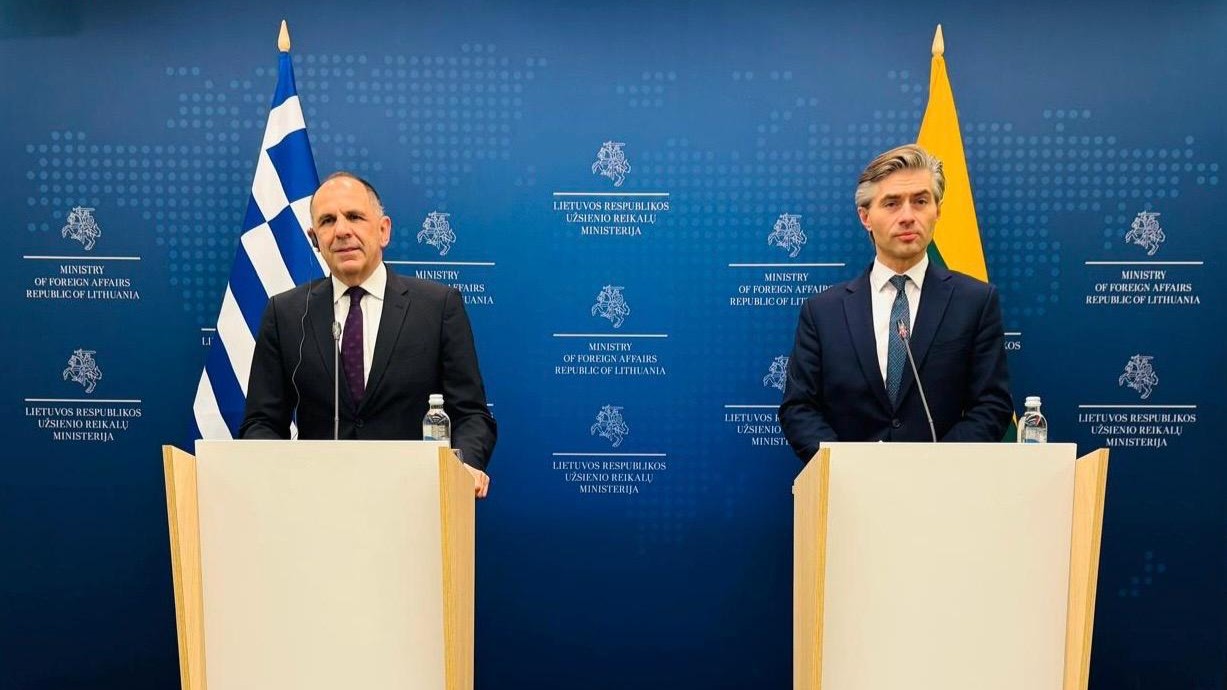
Thank you. It's a great honor, a great pleasure to be here in Vilnius to meet a colleague, a close friend, to receive this warm hospitality and to declare once again the importance of being together in unity. To develop common strategies, common policies to safeguard the security of our nations, but also the safety and prosperity in Europe.
First of all, my dear friend Kęstutis, let me congratulate you on assuming your duties. The new duties are very heavy in very challenging times. But I think it is important that we have strong people in key positions in Europe, in order to develop our common policies. This is my first bilateral visit here in Vilnius in this beautiful country, Lithuania. And it is an excellent opportunity to further foster the possibilities of our cooperation and developing our relations.
Geography is a key factor obviously in international affairs. It shapes the perspective that we perceive the world. Both Lithuania and Greece are NATO allies. We are not very close geographically, but we are very close when it comes to the perspective we have about Europe and about the rules-based, principled policy in international law. Greece is positioned in NATO’s southeastern and Lithuania in the eastern flank. We essentially have this important aspect in common, which is the European borders.
Our direct geopolitical environment is fraught with numerous crises, threatening Europe.
I am visiting Lithuania amid the ongoing war in Ukraine, almost three years since the Russian aggression. From the outset we have strongly condemned Russia's illegal invasion of Ukraine and firmly supported Ukraine's territorial integrity and sovereignty. It is our responsibility to do everything in our power, in order to support Ukraine and its people and to regain fully-fledged independence.
As far as the Middle east is concerned, we have upheld a solid stance based on principles and values. We completely welcome the ceasefire agreement and we hope that there's going to be a lasting agreement for the stability of the region, but also for the stability of the world altogether. Our concerns align with those of my friend and colleague in many major challenges, including migration, climate change. And of course, hybrid threats from which we are all suffering in many ways.
First, I would like to express my solidarity and my country's solidarity with the Baltic Sea countries after the undersea data-cable damage affecting critical infrastructure. No interference should be tolerated. And we are going to be fully in solidarity in this respect. The resilience and security of our infrastructure should be a top European priority.
Due to our geography, Greece and the Baltic states have been in a coordination on migration. We have suffered significant violations when it comes to migration, with hybrid threats, with instrumentalization. We need to actually further develop our joint migration policy and we welcome the implementation of the Migration and Asylum Pact in the context of the European Union. We need to promote European Union policies that address security concerns and effective border protection, according to the principle of solidarity and humanitarian law.
Strengthening the European security architecture is paramount, but also ensuring that our approach is comprehensive in facing all challenges, including those emanating from the South. We also need to promote the key strategy of autonomy of the European Union, while of course deepening the liaisons between the European Union and NATO and enhancing our cooperation within NATO.
During our conversation, we agreed to further expand our relations in key policies, such as defense, which is a key factor for Europe. We also wish to further cooperate within the framework of the Three Seas Initiative, which envisions implementing significant interconnectivity projects in the fields of energy, transport and data.
Greece has become the 13th member of the Initiative. Our participation has added a new dimension, incorporating a “fourth” Sea, the Aegean Sea, in the already existing "Three Seas". We have prioritized participating in initiatives promoting economic development and cooperation, as well as energy cooperation.
It is of utmost importance for energy cooperation to result in energy security and autonomy in Europe, because without energy security there can be no European autonomy. And this is really crucial. We aspire to become an energy hub in Southeastern Europe. We have developed a lot of infrastructure projects to actually contribute to the diversification of energy sources with special emphasis of green energy, on renewable energy sources. And it is important to try and develop further our connectivity when it comes to energy.
My dear friend, dear Kęstutis, Greece's term as an elected member of the Security Council of the United Nations has recently commenced. We would be honored and delighted to echo the voice of Lithuania also within the Security Council. There are some strong security concerns now in place. It's probably the most challenging time after World War II. And it is really crucial that we stay together in solidarity, in order to show to the world, the need for further peace, stability and prosperity. We look forward to collaborating closely with Vilnius within the United Nations.
Once again, I would like to thank you for your warm hospitality. I hope to be able to come here again on other occasions, including to watch basketball with my favorite team. We will always be friends when it comes to strategic and political cooperation and allies in the European Union and NATO.
Thank you very much.
January 29, 2025


